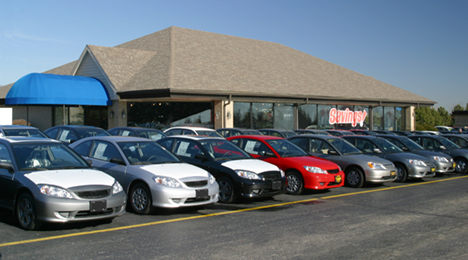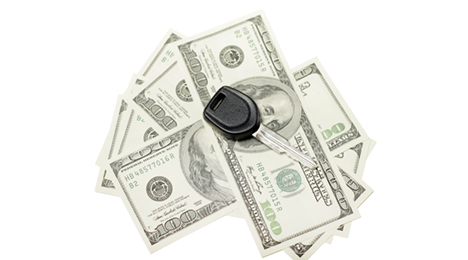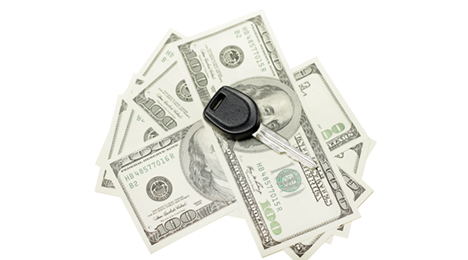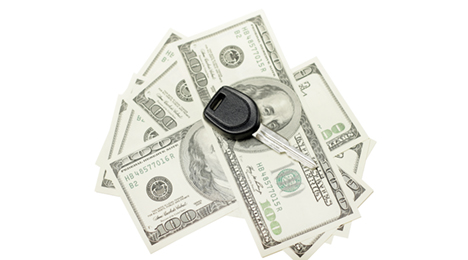Consumer Portfolio Services finalized the closing of its first term securitization in 2016 this week. The transaction is CPS’ 19th senior subordinate securitization since the beginning of 2011 and the second consecutive securitization to receive a triple A rating on the senior class of notes from two rating agencies.
In the transaction, officials from the subprime auto finance company highlighted qualified institutional buyers purchased $329,460,000 of asset-backed notes secured by $340 million in automobile receivables purchased by CPS. The sold notes, issued by CPS Auto Receivables Trust 2016-A, consist of five classes.
Ratings of the notes were provided by Standard & Poor’s and DBRS and were based on the structure of the transaction, the historical performance of similar receivables and CPS’ experience as a servicer.
The company retained the most subordinated notes, Class F, in the principal amount of $10,540,000.
| Note Class |
Amount |
Interest Rate |
Average Life |
Price |
S&P Rating |
DBRS Rating |
| A |
$177.65 million |
2.25% |
.89 years |
99.99619% |
AAA |
AAA |
| B |
$42.50 million |
3.34% |
2.21 years |
99.98194% |
AA |
AA |
| C |
$51.85 million |
3.80% |
2.86 years |
99.97672% |
A- |
A |
| D |
$36.55 million |
5.00% |
3.59 years |
99.97570% |
BBB |
BBB (low) |
| E |
$20.91 million |
7.65% |
4.04 years |
99.97014% |
BB- |
BB (low) |
| F |
$10.54 million |
7.65% |
4.05 years |
Retained |
B |
B (low) |
Officials pointed out the weighted average yield on the notes, including the retained notes, is approximately 4.34 percent.
CPS indicated the 2016-A transaction has initial credit enhancement consisting of a cash deposit equal to 1.00 percent of the original receivable pool balance. The final enhancement level requires accelerated payment of principal on the notes to reach overcollateralization of 4.00 percent of the then-outstanding receivable pool balance.
The company mentioned the transaction utilizes a pre-funding structure, in which CPS sold approximately $255.9 million of receivables this week and plans to sell approximately $84.1 million of additional receivables during February.
“This further sale is intended to provide CPS with long-term financing for receivables purchased primarily in the month of January,” officials said.
“The transaction was a private offering of securities, not registered under the Securities Act of 1933, or any state securities law,” they continued. “All of such securities having been sold, this announcement of their sale appears as a matter of record only.”
Less than two months after Mark Floyd took the reins again as chief executive officer of Exeter Finance Corp., the interim leader used SubPrime Auto Finance News as a conduit to relay a message to dealers already in the subprime auto finance company’s network or stores considering it as a financing source for their retail customers.
After completing a year that included significant changes in how the company functions, Floyd insisted that “a big focus is service to our dealers. The dealers are obviously very important and critical to our success. We’re looking at how we can improve our service to dealers.
“I think our decision times are second to none in the industry,” he continued. “We have a dedicated sales team in the local market that are the face of the organization to our dealer customers. We offer competitive programs.
“But we also know we have areas in which we can improve,” Floyd added. “Those are our top priorities. We want dealers to get the attention they deserve. … That’s where the business begins.”
Floyd’s position with Exeter intensified again back on Dec. 8 when he returned as CEO on an interim basis following the resignation of Tom Anderson. The leadership change came after the finance company completed a major transformation from what Floyd described as “a decentralized branch network to a centralized model.” Now Exeter processes contracts and completes other work from its headquarters in Irving, Texas, along with another facility in Clearfield, Utah.
“That was a very dramatic change for the organization,” Floyd said. “It positions us for the future very well. All the major changes have been done. It’s good to be able to say that. That was a big accomplishment that wasn’t easy. Our team here at every level of the company is really focused and energized and ready to move forward so that’s really good to have that in our rear view mirror.
“Now we’re focused on the task at hand and moving forward,” he went on to say.
Part of moving forward for Exeter is continuing to gather dealer feedback about its processes and responding accordingly.
“Any change that dramatic is going to get mixed results. My perspective is (dealers) see the benefit of what we’ve done,” Floyd said.
“When you’re going through change that dramatic, a few things fall through the cracks here and there,” he continued. “We try to stay close with the dealers and ask for their honest feedback. And we all know they’re honest with their feedback, which is great. We’re taking that feedback and using it to improve what we have.
“For the change that we went through, I would rate the feedback as OK. But as you would expect, there are areas where we could have done better and we will do better,” Floyd went on to say.
Floyd is upbeat that not only will Exeter satisfy the dealers already in its network, but that more stores will start to send installment contracts its way.
“There is a universe of dealers where we haven’t even tapped into yet. We have an opportunity to expand our base. That’s part of our focus for 2016,” he said.
Along with his duties with Exeter, Floyd also is the current president of the National Automotive Finance Association. He touched on how the industry in general is functioning during his recent phone conversation with SubPrime Auto Finance News.
“The competition still is behaving rationally. That’s always a good thing for the industry. I continue to see that so it’s very encouraging,” he said.
“I really do believe the industry has learned lessons from the past,” Floyd continued. “There are always going to be some bumps along the way, but everybody’s antenna are up on any changes that might be coming and are responding appropriately. I’m encouraged about what I see and the outlook is very positive.”
Floyd also is quite positive about Exeter’s future now and when another CEO takes over the finance company.
“I couldn’t be more excited about the prospect for Exeter,” he said. “We have a strong capital structure in place and probably the best financial sponsor in the business in Blackstone. We have outstanding bank partners and strong consistent support for our securitization program.
“When I look at the industry, look at our strong capital structure at Exeter, look at the quality of people we have and everybody’s engagement in the business for what we see as the future, all of the pieces are in place for Exeter. It’s a good time to be at Exeter,” Floyd went on to say.
Fitch Ratings isn’t necessarily sounding alarms over what the Federal Reserve did with interest rates before the holidays arrived. It’s how the Fed might adjust rates during the next four years that is sparking analysts’ interests.
Fitch acknowledged on Monday that rising interest rates could pressure U.S. auto ABS transactions, especially first on subprime deals.
“While last month's initial rate increase is expected to only have a marginal near-term impact on borrowers, the Federal Reserve plan to raise rates gradually over four years could increase the monthly debt burden on auto loan borrowers,” analysts said.
“Although the rate increases are expected to affect the entire market, Fitch believes subprime borrowers may face a greater financial burden within this environment as they are more exposed to stagnant wage growth and have a weaker history of financial stability,” they continued.
Fitch emphasized that any economic setback would touch subprime borrowers first even though the U.S. employment rate has sunk to 2007 levels. Despite slight upturns in 2015, analysts pointed out that wage growth has largely been stagnant over the past five years and hasn't matched inflation or housing prices.
“Should this trend continue, wage growth for certain consumers may not match the Federal Reserve's planned increases,” analysts said.
“Over the past five years, consumers have taken advantage of low rates to prepay loan balances,” they continued. “With higher interest rates, greater higher prepayment rates become less feasible and may prolong loan terms. The household debt-to-income ratio could also increase, creating less discretionary cash available to pay down auto loan balances.”
Fitch then discussed how finance companies might respond in order to keep their origination volumes at projected levels.
“In this environment, auto loan originators could be forced to increase extended-term lending or incentive spending to keep monthly payments at affordable levels for U.S. consumers,” Fitch said.
“Extended-term contracts are already a raising concentration in ABS pools that hinder asset performance over time and typically perform weaker than standard-term 60-month or less auto loans,” the firm continued. “Loss severity on extended-term contracts is high since defaults typically occur earlier in the life of a loan when the borrower has little to no equity in the vehicle.”
During the past five years, Fitch noted the auto ABS market has largely been buoyed by a robust used vehicle market that will remain healthy in early 2016.
However, Fitch expects vehicle values to be pressured due to increased supply over the next few years, contributing to lower recovery rates.
In December, Fitch's auto ABS annualized net loss indices reached 0.60 percent and 9.20 percent for prime and subprime, respectively.
If defaults increase due to higher interest rates in a weaker wholesale market, Fitch expects both the prime and subprime annualized net loss indices to climb higher,” analysts said.
Subprime auto finance company Exeter Finance Corp. announced today that Tom Anderson has resigned from his role as chief executive officer and as a member of the board of directors to pursue other interests.
Mark Floyd, a member of Exeter's board of directors who formerly served as Exeter's CEO and co-chief operating officer at AmeriCredit has been appointed interim CEO.
It’s only been a little more than a year since Floyd stepped down from his executive role and Anderson came into the picture.
“I would like to thank Tom for his leadership during a crucial time for Exeter when the company consolidated its originations platform and streamlined its operations, resulting in a much more efficient company with rapidly increasing profitability,” said Martin Brand, chairman of Exeter's board of directors. “We are excited about Exeter and its prospects and thank Tom for his leadership.
“We are also grateful that Mark Floyd has agreed to come back from retirement and step in as interim CEO,” Brand continued. “Mark is a highly respected executive with extensive industry experience in auto finance. His strong track record and previous tenure as CEO make him an ideal and natural choice for interim CEO.”
Exeter previously highlighted that Anderson came to the company as a seasoned executive with nearly three decades of management and financial services industry experience. Anderson served in a variety of leadership and CEO roles at leading global organizations, including Capital One, Amerifee, Upromise, Sallie Mae, Integrity Interactive, and Education Dynamics.
"It is hard for any company to transition from a start-up to high growth to a professional organization,” Anderson said. “I am happy to have contributed to that evolution.”
But now Floyd is back at the controls of Exeter, which recently executed a $300 million securitization backed by automobile loan receivables.
“During my over five years as an executive and member of the Exeter board, I have had the privilege of serving the company as it has evolved into a major player in the auto finance industry,” said Floyd, who also is the current president of the National Automotive Finance Association.
“I look forward to working with Exeter's deep and experienced leadership team as we continue that evolution. I am fully committed to ensuring a seamless transition and continuity in leadership,” he went on to say.
The combination of investor money and an online platform created by what the company calls an “A team” of industry veterans who have collectively more than 110 years of experience in automotive, below-prime automotive finance, billions of dollars of securitization execution and asset performance management generated a new website — SpringboardAuto.com.
On Wednesday, the site founders Jim Landy and Stuart Holmes described SpringboardAuto.com as a new direct-to-consumer auto loan platform that “completely reinvents the auto lending experience.”
SpringboardAuto.com originates and services loans for institutional investors. Providing an alternative to investors purchasing prime unsecured assets, SpringboardAuto.com offers loans to below-prime borrowers that are secured by a high utility asset.
Based in Irvine, Calif., the company is set to launch the new auto loan service early next year. SpringboardAuto.com is designed to enable consumers to refinance existing auto loans, or finance the purchase of a new or used vehicle directly online or via a smartphone, leveraging data and analytics to facilitate a fast, convenient, and transparent online loan process.
SpringboardAuto.com founders insisted that their new site can provide benefits for all stakeholders:
1. Consumers
Unlike other models that seek to monetize the loan applicant via the dealership, SpringboardAuto.com is designed to put the consumer in control and at the center of the loan process, offering faster decisions and online tools.
“SpringboardAuto.com will ultimately deliver a better consumer experience,” officials said.
“Consumers will have insight into information they may not otherwise be privy to in other lending models,” the continued. “Consumers will see how choices they make as they configure their loan, in variables such as loan term and reduced sale price, effect their overall final loan obligation.
2. Private Party Sellers/Buyers
The founders explained SpringboardAuto.com’s platform can bridge existing process challenges with private party transactions by enabling buyers and sellers to securely and easily transact and close their vehicle purchase and sale within the website.
“This includes everything from financing and inspections to DMV paperwork,” they said.
3. Dealers
Officials added that SpringboardAuto.com can fund loan applicants for a specific vehicle and funnel the qualified customer directly to the dealership at no charge.
“Even with lost rate mark-up, this transaction is a much more efficient below prime transaction for dealers when you account for the elimination of any lender fees, discounts and lead fees,” the founders said.
“The SpringboardAuto.com process will reduce the hours typically spent with subprime customers,” they added.
According to the recent Car Buyer of the Future study by Autotrader, nearly three-fourths of consumers want to complete credit applications and financing paperwork online. Among the key factors driving this trend is a desire to save time at the dealership and have less pressure while filling out paperwork.
Furthermore, a recent study from PriceWaterhouseCoopers showed that the overall experience — including speed, transparency and customer service — often trumps interest rate as a consumer’s biggest consideration when choosing a lender.
“The market for auto loans has changed dramatically over the past few years, yet auto lenders have not kept up with today’s consumer demands, especially those of the technical-savvy millennials who live and breathe on their smartphones and account for 37 percent of all funded auto loans,” said Landy, who is chief executive officer of SpringboardAuto.com.
“In general, borrowers, especially those with less than perfect credit, are incredibly dissatisfied with the opaque and frustrating car-financing process. Our mission is to change that.”
Holmes also reiterated how the site is geared to benefit its users
“Our goal is not to simply digitize the same old process; instead, our platform, which is fully mobile optimized, will speed it up by reducing redundant data and endless document requests — all while minimizing potential impact on an applicant’s credit score,” said Holmes, chief marketing officer of SpringboardAuto.com.
“And, ultimately, the entire process will happen easily and efficiently — from loan, to trade-in, to final purchase — for both private party and dealer purchase,” Holmes went on to say.
Fitch Ratings analysts used the terminology “minor cracks” to describe the auto ABS loss trends they continue to see emerging in both the U.S. prime and subprime markets.
Analysts spotted that subprime annualized net losses rose for the fifth consecutive month to 8.05 percent in October, further diverging from prime annualized net loss trends.
“Despite weaker asset performance, Fitch-rated subprime auto loan ABS are still performing well within initial expectations heading into the end of the year,” Fitch said.
The firm explained that prime and subprime ABS asset performance continues to perform well within historical levels supporting positive rating actions across both sectors throughout the year. Fitch upgraded 66 tranches of outstanding prime and subprime auto loan ABS notes through October of this year, up from 63 during the same period in 2014.
“Looser underwriting including lower FICO scoring, higher loan-to-values (LTV) and extended loan terms witnessed in 2013-2014 vintage securitized ABS pools are contributing to softer asset performance in late 2015,” analysts said.
Fitch reported prime annualized net losses reached a four-year high of 0.53 percent in October; a reading virtually unchanged over September. Those losses also ended up 33 percent above year-earlier levels.
Analysts pointed out that prime annualized net losses remain well below the historical average figure of 0.93 percent going back to January 2001. They mentioned prime 60-day delinquencies stood at 0.38 percent in October versus 0.39 percent the prior month. Fitch also said delinquencies were only 5.6 percent higher in November versus a year earlier.
The firm also reiterated that subprime annualized net losses remain well below the peak recessionary levels of 10 to 13 percent recorded in late 2008 and early 2009. The October annualized net loss figure was also just 5.8 percent higher versus the same month in 2014.
Fitch indicated subprime 60-day delinquencies rose to 4.56 percent in October, up 2.2 percent over the prior month and 13.4 percent higher versus October 2014. The firm added the peak delinquency range was 4.75 percent to 5.10 percent recorded during the recent recession.
Analysts went on to mention “solid” used-vehicle values late this year are supporting auto ABS performance.
The Manheim Used Vehicle Value Index hit 125.3 in October, rising five consecutive months during a period which typically is the weakest of the year, according to Ftich. The index was at a high in October, consistent with January's rate. The index peak was 127.8 recorded in May 2011.
“Factors supporting used-vehicle values include a healthy new vehicle market with sales topping 18 million units (seasonally adjusted annual rate) in October, along with solid demand for used vehicles and readily available financing and low interest rates,” analysts said.
Fitch’s auto ABS indices comprise $92.2 billion in outstanding notes, of which prime auto loan ABS comprises 61 percent and subprime ABS 39 percent of that total dollar amount.
Two significant players in the auto finance space — Ally Financial and Exeter Finance — each shared details about recent company developments.
At Exeter, the company announced on Monday that it closed a $300 million securitization backed by automobile loan receivables. Company executives indicated the transaction closed on Oct. 21.
They added the private offering was announced on Oct. 13 and priced two days later.
The offering included four classes of fixed rate notes issued by Exeter Auto Receivables Trust (EART) 2015-3.
The Class A notes were rated AAA/AA by DBRS and Standard & Poor’s, respectively, while the remaining three tranches were rated A, BBB and BB by both agencies. The classes have weighted average lives of 1.03, 2.77, 3.50 and 4.05 years, respectively.
Upon the closing of the transaction, Exeter explained the net proceeds from the sale of the notes were applied to reduce borrowings outstanding under the company’s existing warehouse financing facility.
Executive added Citigroup and Wells Fargo Securities acted as joint book runners on the transaction, with Barclays, Deutsche Bank Securities and Goldman, Sachs & Co. participating as co-managers.
Ally Financial announces redemption of all remaining Series G preferred shares
In other industry news, Ally recently announced that it received approval from the Federal Reserve to redeem 1,288,301 shares of its Fixed Rate Cumulative Perpetual Preferred Stock, Series G (Series G Preferred Shares).
Executives indicated the shares will be redeemed at a price of $1,000 per share plus all accrued and unpaid dividends through the redemption date, for a total of $1,005.64 per share. The redemption date will be Dec. 14.
“The elimination of all remaining Series G Preferred Shares will decrease our preferred dividend burden and allow the company to optimize future capital management to drive shareholder value,” Ally chief executive officer Jeffrey Brown said.
“Addressing this remaining legacy security will remove the restriction the company had on offering common equity distributions and position Ally to meet its objective of initiating a dividend and share repurchase program in 2016,” Brown continued.
Ally reiterated the terms of the Series G Preferred Shares — which were developed during the financial crisis — prohibited the company from offering a dividend on common equity shares. In April, Ally redeemed approximately $1.3 billion of its Series G Preferred Shares.
The notice of redemption and related materials were delivered to registered holders of record of the Series G Preferred Shares.
Questions relating to and requests for additional copies of the notice of redemption and related materials should be directed to the redemption agent. Here are the details:
Computershare Trust Company
c/o Computershare
Corporate Actions
250 Royall Street
Canton, Mass. 02021
Attention: Reorganization Department
Or individuals can call (855) 396-2084.
Fitch Ratings recently published an updated asset-backed sector specific criteria report.
Analysts indicated there have been no “material” changes from the previous version, so therefore Fitch expects no impact on outstanding ratings.
The firm noted this report updates and replaces the prior criteria report with titled, Rating Criteria for U.S. Auto Loan ABS, dated April 10.
The report presents Fitch’s analytical approach to rating prime and nonprime U.S. auto loan ABS and outlines the unique features of these transactions. Additionally, the report details key rating drivers associated with U.S. auto loan ABS as detailed below.
1. Collateral performance
Fitch’s expectation on collateral performance is a key rating driver. Fitch assesses future performance expectations through an analysis of an originator’s historical static pool and securitization data, including delinquencies, defaults, net losses, recoveries, loss timing and prepayments. Fitch analyzes granular collateral pool/loan tape characteristics and risk concentrations to determine credit risks present that drive transaction loss frequency and loss severity.
2. Macroeconomic risks
The economic environment can have a material impact on U.S. auto loan ABS ratings. Fitch takes into consideration the strength of the economy, as well as future expectations, by assessing key macroeconomic indicators that are correlated with asset performance, such as unemployment rates.
3. Forward-looking approach to derive base case loss proxy
Fitch derives its base case proxy by examining fully amortized historical vintage loss curves, extrapolating incomplete vintage curves, matching future expectations with any relevant previous vintage data, and weighting by relevant pool credit characteristics. Additionally, a margin of safety is built into the base case by weighting previous recessionary vintages and adding adjustments for future unemployment expectations and/or wholesale vehicle market conditions, where applicable.
4. Payment structure
A transaction's payment structure and cash flow allocations will be a major driver in assessing credit enhancement (CE) adequacy and to determine ratings. Fitch uses a Microsoft Excel-based internal cash flow model customized to reflect the transaction payment structure and tests the impact of stressing various assumptions, including prepayments, default timing, recovery rates and recovery lag. The output of the cash flow modeling is reviewed to assess whether the rated bonds are fully paid, in accordance with the transaction documents, in each stress scenario associated with a bond's rating.
5. Legal risks
Legal risks can affect the rating in the event that legal uncertainties pose a threat to the availability of cash flows or the collateral itself. Fitch's legal analysis includes a review of the legal structure and legal opinions furnished by the originator to confirm cash flow derived from the assets will not be impaired (either as a result of the bankruptcy or insolvency of the originator or any other transaction party, such as a swap counterparty, or the trustee's lack of a perfected first-priority security interest in the assets) or diminished (as a result of taxation).
6. Counterparty exposures, including seller/servicer operations
Counterparty exposures can pose a risk to transactions if the relevant counterparties are a source of credit or performance weakness. The analysis incorporates a review of the counterparties of an auto loan ABS transaction, including operational (originations, underwriting and servicing) and corporate reviews, to determine and ensure consistency with Fitch's counterparty criteria titled, Counterparty Criteria for Structured Finance and Covered Bonds, from May of last year.
Consumer Portfolio Services recently closed its third term securitization of the year.
The company pointed out the transaction is CPS’ 18th senior subordinate securitization since the beginning of 2011 and the first securitization to receive a triple-A rating on the senior class of notes from two rating agencies.
In the transaction, qualified institutional buyers purchased $300 million of asset-backed notes secured by auto receivables purchased by CPS. The sold notes, issued by CPS Auto Receivables Trust 2015-C, consist of six classes.
Ratings of the notes were provided by Standard & Poor’s and DBRS and were based on the structure of the transaction, the historical performance of similar receivables and CPS’s experience as a servicer.
| Note Class |
Amount |
Interest Rate |
Average Life |
Price |
S&P Rating |
DBRS Rating |
| A |
$156.74 million |
1.77% |
.93 years |
99.99225% |
AAA |
AAA |
| B |
$37.50 million |
2.55% |
2.25 years |
99.98180% |
AA |
AA |
| C |
$45.75 million |
3.42% |
2.91 years |
99.97671% |
A |
A |
| D |
$32.25 million |
4.63% |
3.64 years |
99.97997% |
BBB |
BBB |
| E |
$19.50 million |
6.54% |
4.08 years |
99.98879% |
BB |
BB |
| F |
$8.26 million |
7.51% |
4.08 years |
99.98473% |
B |
B |
The weighted average effective coupon on the notes is approximately 3.78 percent.
CPS explained the 2015-C transaction has initial credit enhancement consisting of a cash deposit equal to 1.00 percent of the original receivable pool balance. The final enhancement level requires accelerated payment of principal on the notes to reach overcollateralization of 4.00 percent of the then-outstanding receivable pool balance.
Officials added the transaction utilizes a pre-funding structure, in which CPS sold approximately $197.9 million of receivables in September and plans to sell approximately $102.1 million of additional receivables during October.
“This further sale is intended to provide CPS with long-term financing for receivables purchased primarily in the month of September,” CPS said.
“The transaction was a private offering of securities, not registered under the Securities Act of 1933, or any state securities law,” officials went on to say. “All of such securities having been sold, this announcement of their sale appears as a matter of record only.”
Perhaps underwriting standards aren’t quite as relaxed now as they might have a been a few quarters ago, but Fitch Ratings still is expecting to see “new entrants” into subprime auto financing during the near term.
Along with touching on subprime, Fitch’s latest auto loan asset quality report highlighted a pair of other auto financing trends, including strong U.S. auto loan performance and fewer commercial banks easing underwriting terms.
While underwriting terms remain eased relative to historical standards, Fitch recapped that recent Federal Reserve senior loan officer survey data showed that just 3.3 percent of net respondents eased underwriting standards in the second quarter of 2015. This level is down from 14 percent of net respondents who eased standards in the July 2013 survey.
“Although Fitch views this positively, as long as terms continue to be relatively relaxed, newer loan vintages will continue to underperform earlier ones, eventually leading asset quality to revert to historical averages over the medium term,” analysts said.
Fitch contends that an improving employment picture, steadier economic conditions and falling gas prices are contributing to “robust” vehicle sales. The report mentioned that these same factors could push new-vehicle sales in the U.S. to break 17 million units for the first calendar year since 2001.
“Fitch believes that high levels of competition between major auto lenders will still result in further easing of terms, lower FICOs and new entrants into subprime lending over the near term, despite the decreased pace of easing,” analysts said.
As will be part of the conversations during the SubPrime Forum coming up at Used Car Week in November, the Fitch report went on to note that auto loans are expected to remain one of the faster growing asset classes for U.S. banks and other financial institutions.
Analysts also pointed out the July Fed loan survey showed that over second quarter of this year, loan officers seeing an increase in auto loan demand exceeded those seeing decreases by a margin of 18 percent.
“Macroeconomic factors that correlate with auto loan performance, such as unemployment, also point to the market remaining robust,” analysts said.
“That said, competitive underwriting conditions, combined with potential future pressure on auto residual values and consumers' ability to continue to service their personal debt obligations in a rising rate environment, could push the market toward weaker asset quality over the medium term,” they continued.
Currently however, despite competition, Fitch highlighted that U.S. auto finance companies are still enjoying generally strong asset quality through the first half of the year.
Year-over-year performance for the top nine Fitch-rated auto finance companies was “mixed.” Analysts indicated that performance reflected the continued easing of underwriting standards, higher subprime finance and a decline in used-vehicle values in recent periods.
However, Fitch noted prime loans saw improvements that were attributable to better consumer discretionary spending, “a seasonal effect typical in the first half of the calendar year following year-end consumer spending surges,” according to analysts.
Fitch's prime auto ABS index performance remained “solid,” while Fitch's subprime auto ABS index experienced a 47-percent increase in annualized net losses to 5.44 percent in second-quarter 2015. Nonetheless, the subprime auto loan index still remains well below peak recessionary levels in late 2008 to early 2009.
The top nine Fitch-rated auto lenders, including captives, held about $473 billion of auto loans at the end of June. Of the nine, Fitch pointed out only General Motors Financial and Capital One Auto Finance have any meaningful subprime exposure in their loan portfolios.
A discussion about companies such as GM Financial and Capital One is on tap for the SubPrime Forum panel session titled, “Soaring in Subprime.”
Barrett Teague, vice president of lender solutions at Black Book, will moderate a candid conversation featuring top subprime auto finance lending executives aimed at gathering perspective and C-level opinion on the key foundations of the subprime market and what their companies see as opportunities and challenges.
That panel and more is on tap for the SubPrime Forum, which is part of Used Car Week that runs from Nov. 16-20 at the Phoenician in Scottsdale, Ariz. Agenda details, links to registration and accommodations along with a downloadable list of executives who have already made the decision to attend can be found at www.usedcarweek.biz.












